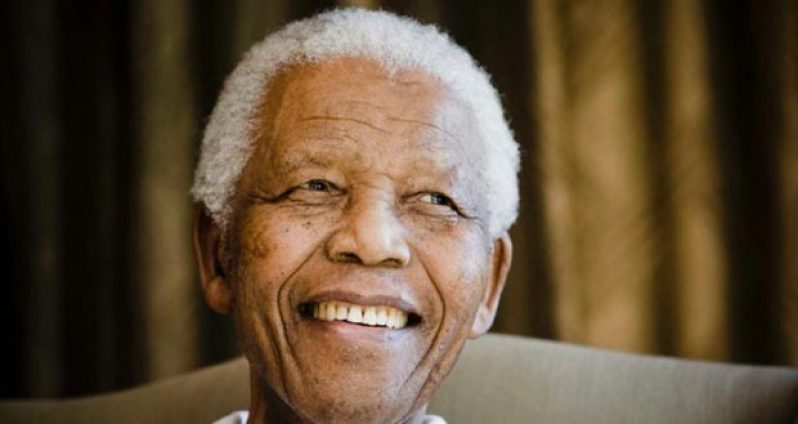WHEN we think of Mandela, we think of the quiet dignity of the man that no current politician can match, but from whom they can learn much!!
In his 1963 trial, Nelson Mandela forcefully defended the African National Congress (ANC)’ actions against apartheid in South Africa, and bluntly spoke about a democratic and non-racial South Africa as an “ideal which I hopeto live for and to achieve. But, if needs be, it is an ideal for which I am preparedto die.”Mandela spent 27 years in prison. Notwithstanding losing the best years of his life, Mandela, at age 75, took on the mantle of becoming the first democratically-elected President of South Africa, and showed the White racial minority in South Africa and the international community that peace is better than killing fellow humans; that a win-win situation is better than a win-lose situation, a major strategy his ANC Government used in the governance process.
‘Mandela, at age 75, took on the mantle of becoming the first democratically-elected President of South Africa, and showed the White racial minority in South Africa, and the international community that peace is better than killing fellow humans; that a win-win situation is better than a win-lose situation, a major strategy his ANC Government used in the governance process’
In his political report as President of the ANC in 1997, Mandela outlined eight (8) principal issues facing South Africa. They were as follow`s: Displacement of the apartheid political order by the democratic system; national perception of ANC as the national liberation movement to guide reconstruction and development; subjection of all sectors of society to reconstruction and development; reconstruction and development to include all religions, moral renewal, and a new patriotism; reconstruction and development relying on an African renaissance; consideration of reconstruction and development within the setting of rapid globalization that is linking people around the world, controlling national sovereignty, and increasing the gap between the rich and the poor; international relations to be in sync with reconstruction and development and to embrace a vision of global democracy, peace, prosperity, and social progress for everyone; and the full acceptance of reconstruction and development by the ANC and other progressive movements.
The much-talked-about positive impact of the Truth and Reconciliation Commission did not negate the active workings of the anti-democratic forces of the counter-revolution in 1997, when Mandela presented this political report to the ANC. And even today, as Mandela is no more, it would not be surprising to see, on the part of these counter-forces, an increased motivation to restore the privileges of the White minority. As Mandela noted in his political report to the ANC in 1997, the progressive democratic movement has not as yet been tested by the counter-forces, because the transformation taking place in South Africa was still in the early years.
But today, in 2013, with the death of Mandela amid a deepening impact of the reconstruction and development process, certainly a transformation that is no longer in the initiation years, as 16 years have elapsed since Mandela presented this political report, and now a weakened economy, the counter-forces may feel morally rejuvenated, and psychologically strengthened to restore their lost pride.
But today in 2013, too, South Africa also has a new breed of South Africans, and a new generation with new institutions that seek to be people-centered in a Mandelian way. This new South Africa today may even be stronger, vowing and guaranteeing the sustainability of Mandela’s eight (8) principles for reconstructing and developing South Africa.
But counter-activities did happen in those early years of reconstruction and development, as noted in this political report.The report gave these examples: The three White parties in parliament, aided and abetted by the media, mounted spirited opposition whenever the Mandela Government introduced measures to end racial disparities; and the transformation of the public service became problematic, as the Mandela Government could hardly remove anyone in a dominant position who was from the apartheid order.
Mandela himself pointed out in that political report to the ANC in 1997 that the opponents of fundamental change attempted to separate the goal of national reconciliation from the critical goal of social transformation, by putting the goals against each other. In so doing, they gave greater importance to national reconciliation, in order to redefine national reconciliation. Their redefinition of national reconciliation would have meant, and possibly still means, compensating the White minority for the loss of its monopolistic power through guaranteeing the restoration of its privileges.
But as he left political office after his first term as President, Mandela noted in this political report to the ANC only two years earlier that racial disparities persisted in the South African society. But he believed in dialogue, as dialogue brought successes, as shown through these examples: His dialogue with the Afrikaans prison warders; his dialogue and recruitment of Soweto Uprising prisoners into the ANC; and while still a prisoner, his negotiations without the ANC’s consent with former Presidents of South Africa, P.W. Botha and F.W. De Klerk, for a better South Africa. These discourses were significant dialogic moments for a man of quiet dignity, who believed that all can win, and all have a place in South Africa.
Lieberfeld, in his “Peace Profile: Nelson Mandela” (2004) cited Mandela’s lesson, thusly: “one of our strongest weapons is dialogue: Sit down with a man [and] if you have prepared your case very well, that man … will never be the same again.” Mandela, indeed, was a man of quiet dignity, and it is this dignity that eventually brought persisting success to his dialogue.
(By Dr. Prem Misir)



.jpg)










